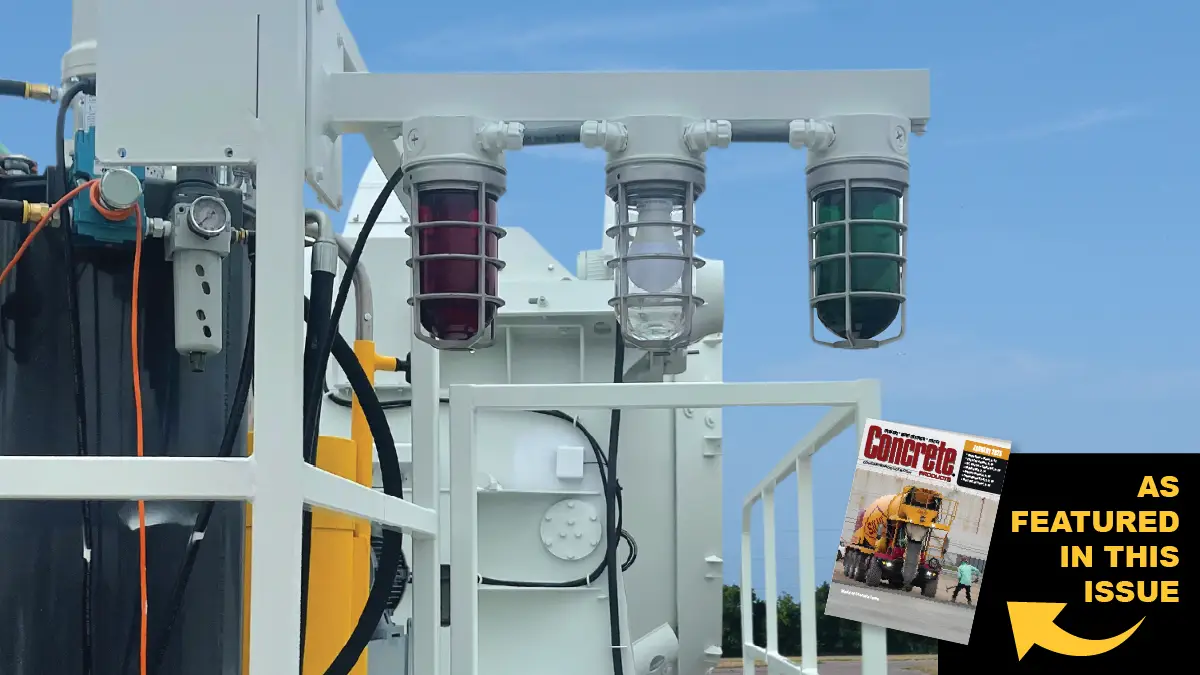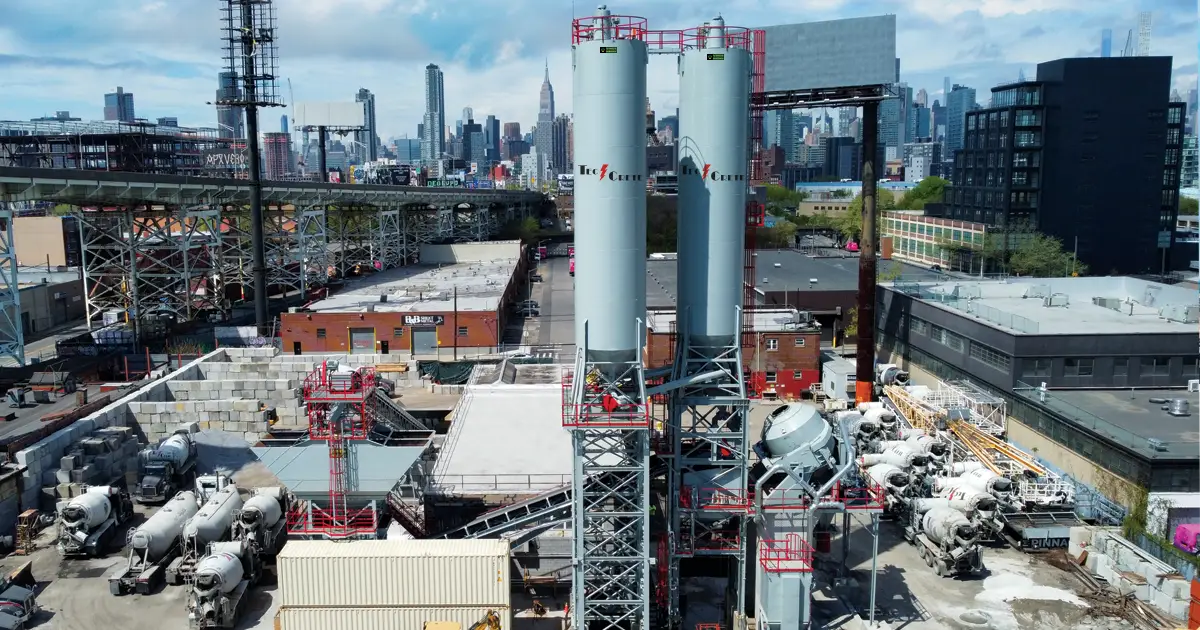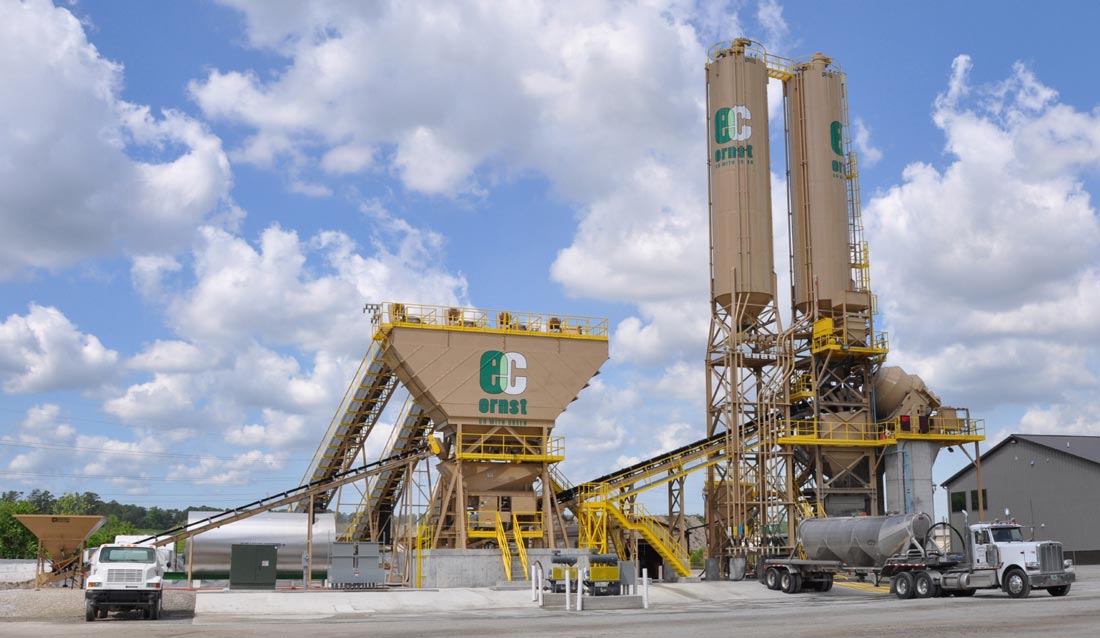
Magazine Feature: Ready Mix LPM Stationary Plant & TM-14 Tilt Mixer
Ernst Concrete rounds out Atlanta market coverage with one of the Peach State’s largest ready mixed plants
Contractors working the south end of Atlanta, traveling the lower Interstate 285 beltway or touching down at Hartsfield-Jackson Atlanta International Airport are noticing a ready mixed concrete brand more associated with areas northeast and northwest of the city.
Ernst Enterprises of Georgia, Inc. (Ernst Concrete) opened its newest ready mixed plant, comfortably rated above 300 yd./hour, in mid-2018. The twin wet/dry alley facility is on the top plateau of a quarry in College Park, bordering the airport periphery and—with bold graphics strategically positioned on 105-ft. twin silos—easily spotted from I-285. The site bridges a market area Ernst Concrete had occasionally served from transit mixed plants in Cobb, Gwinnett and DeKalb Counties, and extends the producer’s prospects in Clayton and Fulton Counties, the latter encompassing the city of Atlanta.
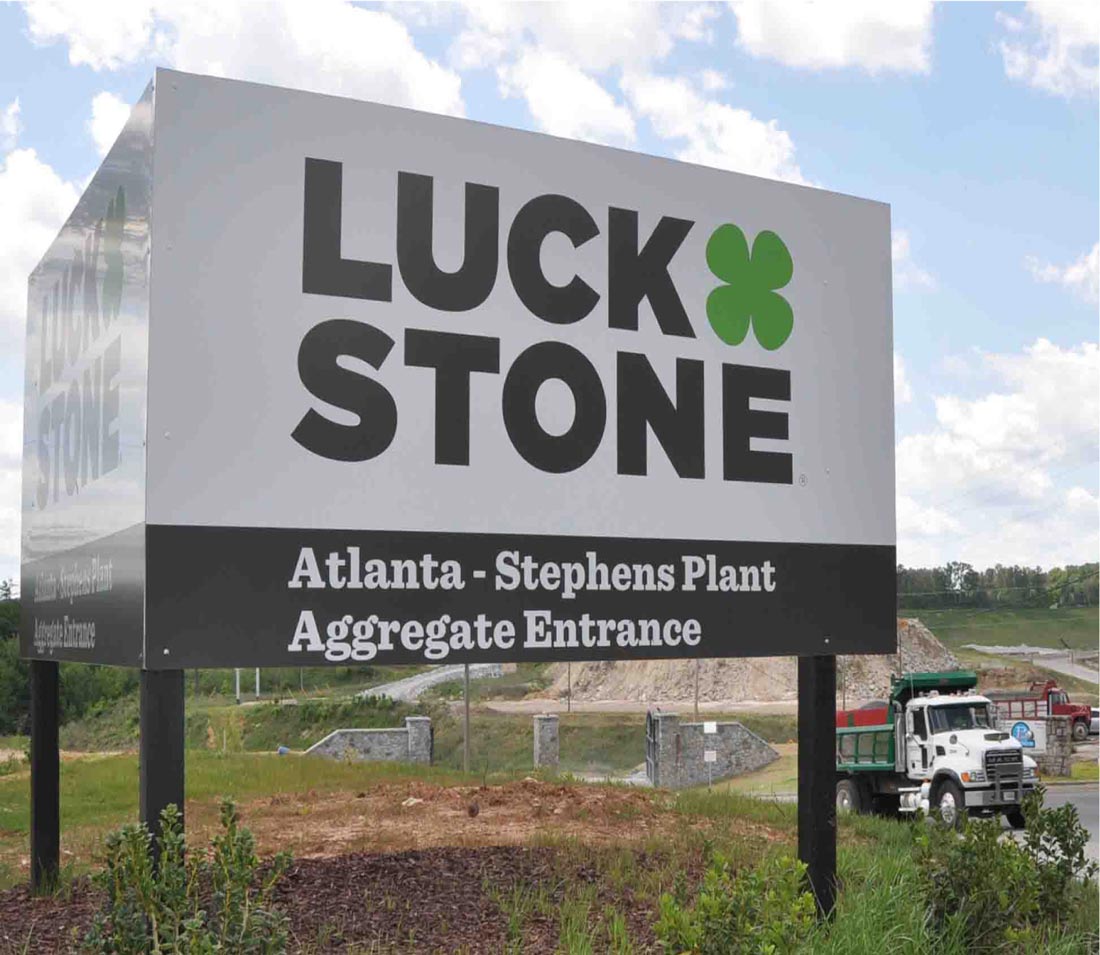
“College Park fills a void. It allows us to supply a growing number of customers from the northern Atlanta market who are now performing work on the south end, and brings us closer to paving and vertical jobs around the airport and into central Atlanta,” says Ernst Sales Representative Tripp Rogers. “With high volume, central mixed concrete capability, we can lock slump control in line with contractor requirements, especially on paving work. With one wet and one dry truck alley, we can meet heavy demand where needed and keep orders within time and temperature specs.”
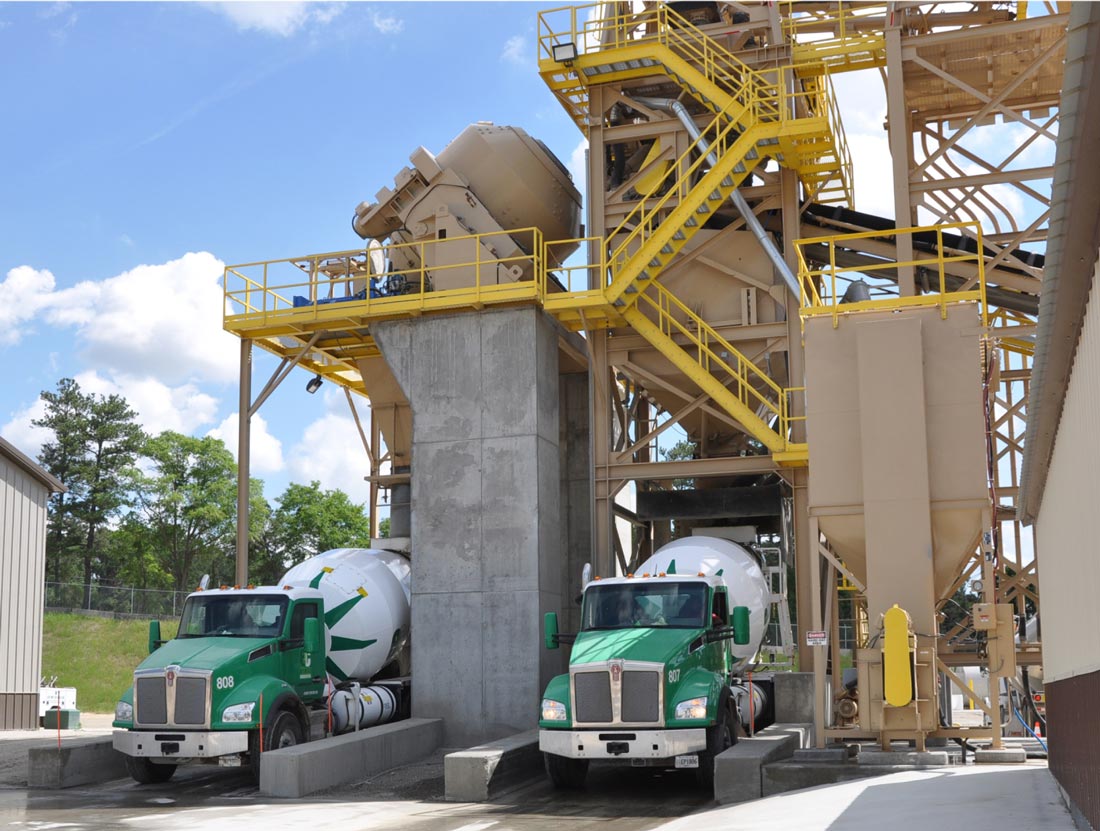
Rear discharge mixers—the first in Georgia for a producer that brought front discharge models to the Atlanta market more than 30 years ago—prepare Ernst Concrete for paving and city site deliveries on the College Park schedule. The operation is the base for 10 new 10.5-yd. Beck Industrial mixers mounted on Kenworth T880 SBA or Mack Granite models. Eight Terex front discharge mixers complete the plant fleet.
Past orders dispatched from sister ready mixed plants to the northeast and northwest could reach toward the south end of the market, Rogers adds, but would stretch slump and 90-minute delivery targets. In a nod to sales prospects among paving contractors and jobs toward central Atlanta, College Park is the first Ernst Concrete plant in Georgia with central mixed equipment—a Vince Hagan TM12 tilt drum anchoring the wet alley—and a fleet of rear discharge mixer trucks. In addition to its Hartsfield-Jackson and I-285 proximity, the new operation positions the producer to deliver loads farther south, into other Fulton County growth areas.
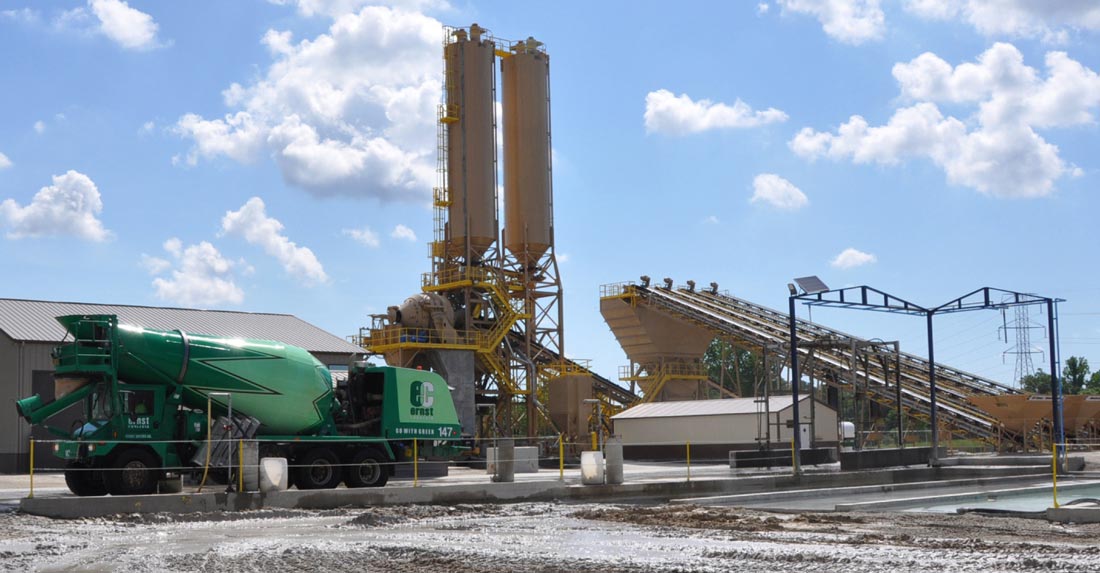
Permitting of the twin alley plant was routine, entailing merely the addition of equipment to a quarry well shielded from residential development. The dispatch building exterior design was subject to review by Clayton County, which has moved to require stone or comparable hard veneer in most commercial development.
The College Park plant has covered existing accounts, developed new business, and occasionally supplied jobs requiring up to 20 trucks per hour throughout its first year. “Atlanta market contractors typically assemble finishing crews to handle up to 120 yards per hour,” notes Operations Manager Scott Ovenshire. “We can easily handle those types of jobs and load up separate, smaller orders at the same time from College Park.”
Plant and fleet visibility, he adds, are spurring orders. One established customer of Ernst Concrete plants to the north was unaware of the College Park location until he saw the five-acre plant expanse and familiar green fleet graphics from a commercial flight landing at Hartsfield-Jackson. “Every week we are picking up business opportunities,” Ovenshire affirms.
Georgia Flourish
Leading into Concrete Products’ last visit (“Active Alleys,” March 2017), Ernst Concrete had doubled transit mixed capacity at the Lawrenceville headquarters plant in Gwinnett County. Volume there and opportunities throughout the Atlanta market have continued to climb. The five counties where the producer does the bulk of its volume are logging annual population gains of 5,000-12,000. They account for nearly half the 80,000 to 90,000 moving each year to Georgia, whose population is projected to eclipse 11 million by 2025.
Residential and commercial building have paced economic development activity indicated in Georgia’s lofty positioning on annual Area Development and Site Selection state business climate surveys since 2012. National Ready Mixed Concrete Association production estimates likewise show demand justifying Ernst Concrete’s capacity and efficiency investments, as annual Peach State volume has soared from a 6.2-million-yd. trough in 2010 to 11.5 million yd. in 2018.
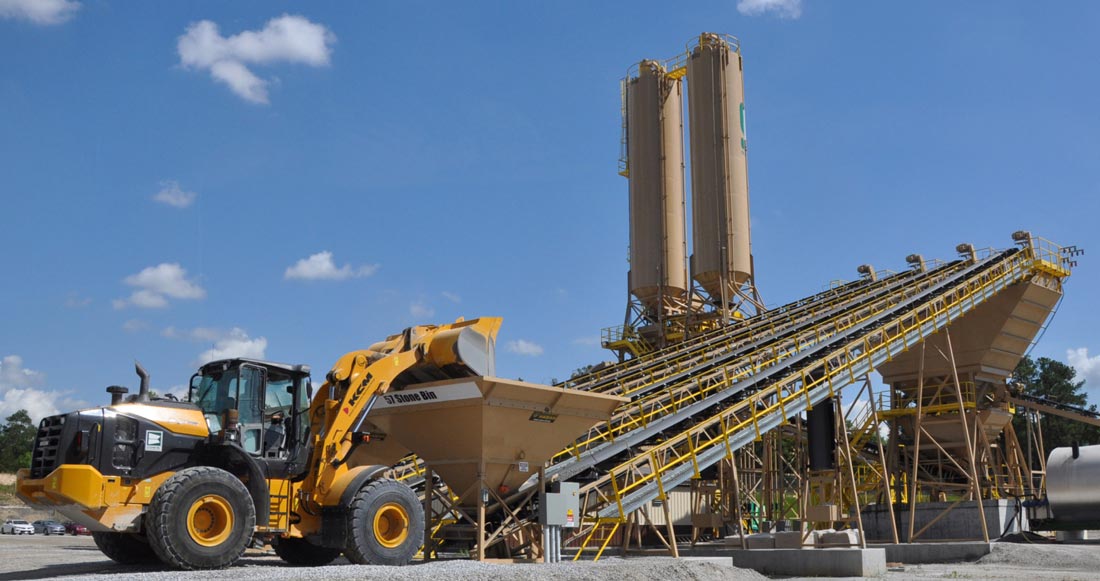
Permitting of the twin alley plant was routine, entailing merely the addition of equipment to a quarry well shielded from residential development. The dispatch building exterior design was subject to review by Clayton County, which has moved to require stone or comparable hard veneer in most commercial development.

Ernst Concrete oriented silo graphics for Interstate 285 and Georgia Highway 85 visibility. The silos rise 105 feet above ground level, but are on a quarry plateau below local roads and nearby highways. The producer set up shop at College Park after an invitation from longtime owner John D. Stephens, who in turn picked a buyer for his prized quarry. The Stephens brand equity is not lost on Luck Companies (top, opposite page).
Pivotal Relationships
Ernst Concrete arrived in the south Atlanta market on the strength of sound management planning, customer relationships and company culture. The College Park plant is located on a leased plot at the Luck Stone Atlanta-Stephens Quarry, source of manufactured sand plus #57, #67 and #89 rock. The producer sited the plant at the urging of former quarry owner John D. Stephens, best known for water and sewer construction in Gwinnett County, and throughout the Southeast and Texas.
“We have had a good relationship with Stephens Industries LP,” explains Scott Ovenshire. “John D. Stephens approached us because he wanted a family-run business like ours to operate in his quarry. He prepared the College Park site near a good entry point for mixers and haulers, and turned it over to us in March 2018. We were running four months later.”
Stephens, whose family had transferred the underground-construction flagship business to an Employee Ownership Stock Plan, was not done dealing after Ernst Concrete started loading concrete at College Park. He saw 2108 as an appropriate time to exit crushed stone, his favored side business, and approached an admired peer— and the industry’s top independent producer—about expanding its footprint in the South. The College Park quarry became the largest investment to date for Richmond, Va.-based Luck Companies, which has rebranded the site while maintaining the Stephens link.
Luck Stone has brought information technology savvy to the crushed stone operation and equipped its ready mixed producer tenant with tools to improve stockpile replenishment, quality control and back office functions. “They have taken the quarry to another level,” Ovenshire affirms.

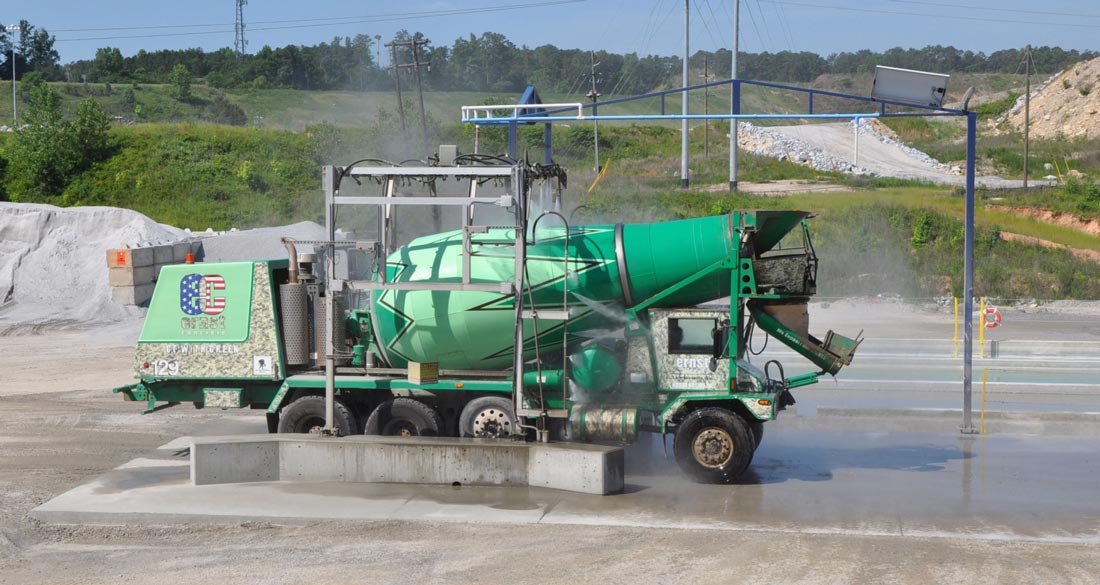
Observing efficiency and safety at Georgia installations prior to College Park, Ernst Concrete has standardized the Load and Go automated truck wash system. Shumaker Industries programs and outfits the rack so operators can customize wash cycles and spray patterns according to truck type.
Ernst Concrete handles transfer of the four fine and coarse grades from its neighbor. Natural sand, required on certain orders, is trucked from outside the market. Dump and tanker trucks entering the College Park property share a wide, common entry with concrete mixers, but see their paths diverge past the gate—materials right, concrete trucks left. “We laid the yard out to eliminate mixer traffic crossing or intertwining with tankers and haulers,” Ovenshire explains. “Mixer trucks have ample staging and parking areas, and the alleys have large digital signs to alert drivers when it’s time to load.”
Vince Hagan Co. customized the twin alley plant with 250 tons of aggregate storage in a five-compartment bin, fed by four 30-in. x 125-ft. conveyors. A specialty material hopper functions as a sixth bin by directly charging into the aggregate batcher and affords added flexibility for out of the ordinary mix designs. Twin silos—one split 50/50, the other 60/40—each have 1,200-bbl. capacity and store cementitious materials from Lehigh Hanson and other suppliers.
Vince Hagan engineers detailed College Park stairways, platforms and catwalks for navigating and maintenance ease, and confined caged ladders to a single silo. The wet alley’s TM-14 tilt mixer can deliver up to 12 yd. in a single batch. A unique holding hopper design with integral aggregate, cement and water compartments allows a full 12 yards of material to charge transit mix trucks at the same time the TM-14 is loading a truck. The Command Alkon batching system will weigh up the next load for either the wet or the dry side of the plant, whichever is available in the job stack. This allows for increased production by having three complete batches in the cue, and enables operators to maintain high output with a range of mix designs.
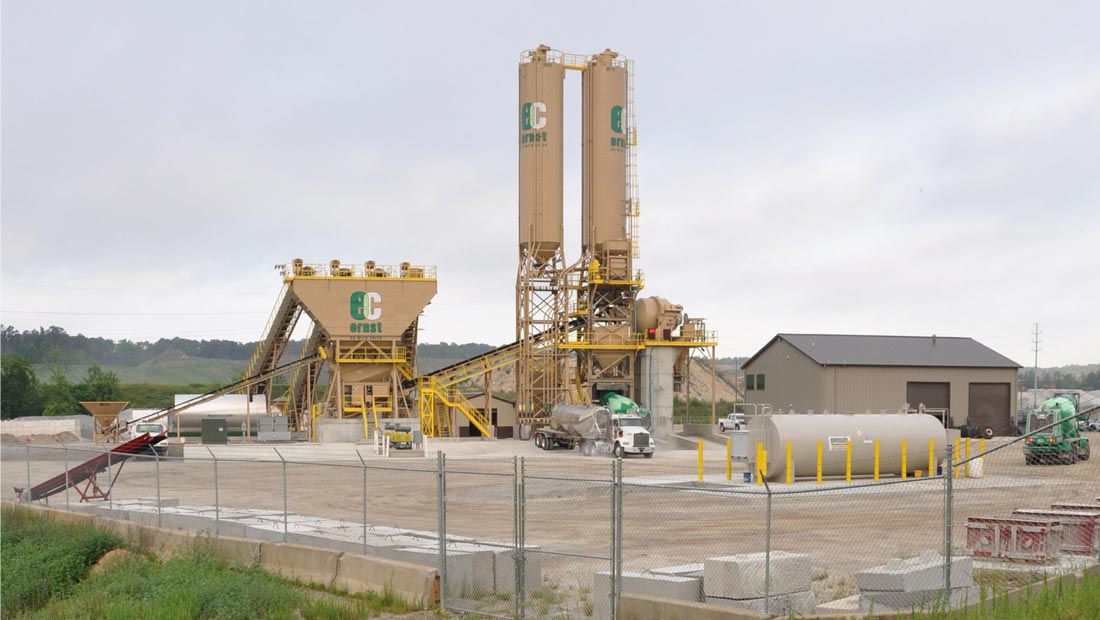
“This is one of the biggest plants in Georgia,” says Plant Manager Admir Mijkic, who joined Ernst after operating concrete pumps and worked in central dispatch prior to being elevated to plant manager. “We are primarily running the dry alley, but can move into high production with central mixed. We have complete production back up for small to large orders.”
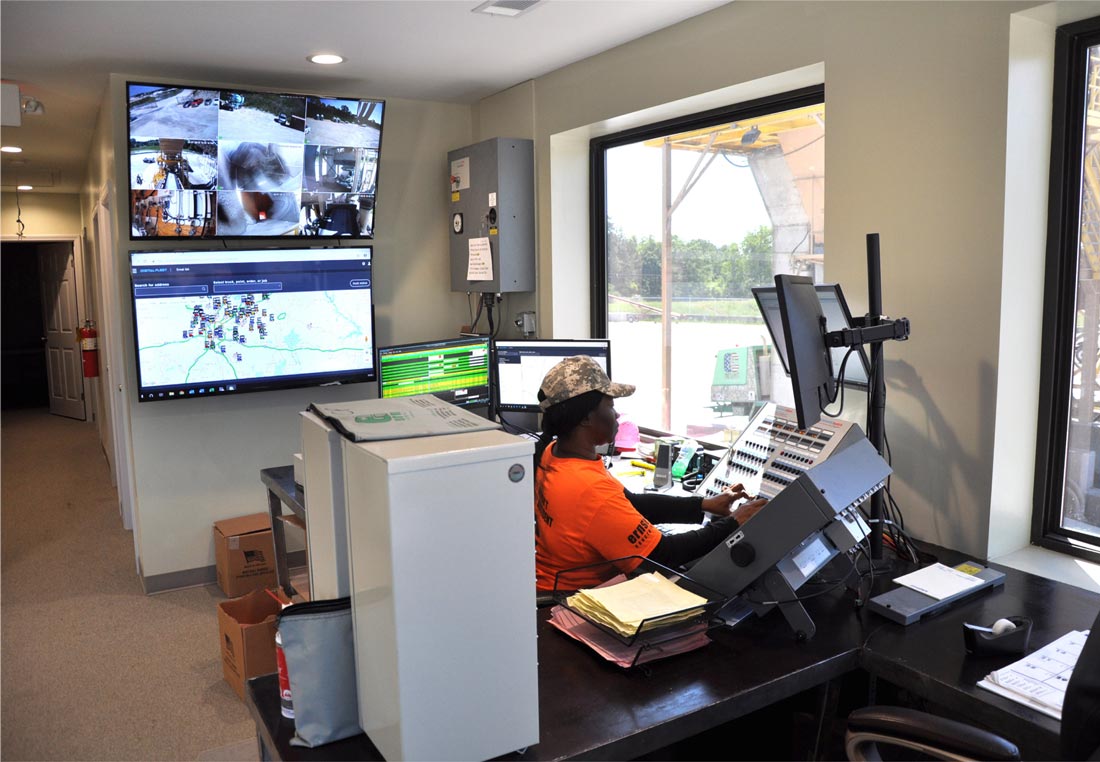
The College Park plant is tied into a central dispatch center at Lawrenceville headquarters. One-time driver Shameko McCants is among charter College Park plant team members and covers order scheduling and verification. Ernst Concrete tracks mixers across nine plants with the GPS-enabled Digital Fleet program. A Command Alkon CB200 panel controls the twin alley plant and provides manual back up.
Vince Hagan Co. continues to build a suite of technology features affording mobile or stationary concrete batch plant owners new, labor-saving remote operation, automated lubrication, diagnostic and preventative maintenance possibilities.
It is time for producers to optimize their plants as part of becoming least-hassle suppliers. Investing in plant automation will pave the way for a higher-quality product and more predictable logistics.
Vince Hagan innovated, manufactured, and installed a Dual Alley LPM Stationary Concrete Batching Plant with a TM-12 Smart Tilt Mixer for Tec-Crete Transit Mix Corporation in the heart of New York City.
